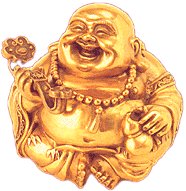|
|



|
Random Image
The Dhammapada
Chapter Nineteen: The Just
One is not just
Who judges a case hastily.
A wise person considers
Both what is and isn't right.
Guiding others without force,
Impartially and in accord with the Dharma,
One is called a guardian of the Dharma,
Intelligent and just.
One is not wise
Only because one speaks a lot.
One who is peaceful, without hate, and fearless
Is said to be wise.
One does not uphold the Dharma
Only because one speaks a lot.
Having heard even a little,
If one perceives the Dharma with one's own body
And is never negligent of the Dharma,
Then one is indeed an upholder of the Dharma.
Gray hair does not
Make one an elder.
Someone ripe only in years
Is called "an old fool."
It's through truth,
Dharma, harmlessness, restraint, and self-control
That the wise one, purged of impurities,
Is called "an elder."
Not through talk alone or by good looks
Does someone envious, stingy, and treacherous
Become a person of good character.
But with these cut off, uprooted, and destroyed,
A person wise and purged of faults
Is called "of good character."
Not by means of a shaven head
Does someone dishonest and undisciplined
Become a renunciant.
How could someone filled with longing and greed
Be a renunciant?
Someone who has pacified evil
Small and great,
In every way,
Is, for that reason, called a renunciant.
One is not a mendicant
Just because one begs from others.
Nor does one become a mendicant
By taking on domestic ways.
But whoever sets aside
Both merit and evil,
Lives the chaste life,
And goes through the world deliberately
Is called "a mendicant."
Not by silence
Does an ignorant fool become a sage.
The wise person, who,
As if holding a set of scales,
Selects what's good and avoids what's evil
Is, for that reason, a sage.
Whoever can weigh these two sides of the world
Is, for that reason, called "a sage."
Not by harming living beings
Is one a noble one.
By being harmless to all living beings
Is one called "a noble one."
Not with
Virtue or religious practice,
Great learning,
Attaining samadhi,
Dwelling alone,
Or thinking, "I touch the happiness
Of renunciation unknown by ordinary people,"
Should you, monk, rest assured,
Without having destroyed the toxins.
...excerpt from The Dhammapada
Continue to Chapter Twenty...



Contact • Feedback • Typo • Privacy • Home